là một chương trình vẽ vector, thường được sử dụng để vẽ hình minh hoạ, hoạt hình, biểu đồ, đồ thị. Adobe Illustrator được dùng để thiết kế : như thiết kế những sản phẩm trong ngành thiết kế quảng cáo, thiết kế in ấn, thiết kế logo, thiết kế bản hiệu, thiết kế thời trang, thiết kế thiệp mời, Tạo các sản phẩm tờ rơi, Cataloge, Card Visit, Broucher, Profile,vẽ hoạt hình, tích hợp chuyển động cho Flash...Adobe Illustrator ưu diểm là dễ dàng thay đổi và trao đổi dữ liệu ,kích thước file nhẹ, dễ dàng tương thích với Photoshop, Corel Draw, và hỗ trợ in ấn rất tốt.
Hôm nay, trung tâm TIN HỌC KEY xin giới thiệu đến các bạn một hệ thống bài tập thực hành vẽ các đối tượng trong Adobe illustrator (Ai) (phiên bản tiếng anh, theo: vectips.com) có hướng dẫn chi tiết các bước thực hiện cụ thể để các bạn dễ dàng thực hành theo. Hôm nay chúng ta sẽ học bài 6: Eureka! Create Your Own Gold Icon Vector. Hy vọng hệ thống bài học này sẽ mang lại cho bạn những kiến thức hữu ích trong quá trình bạn học Adobe illustrator (Ai).
Chúc các bạn thành công!
Eureka! Create Your Own Gold Icon Vector
Final Image
As always, this is the final image that we’ll be creating – your own gold icon vector!
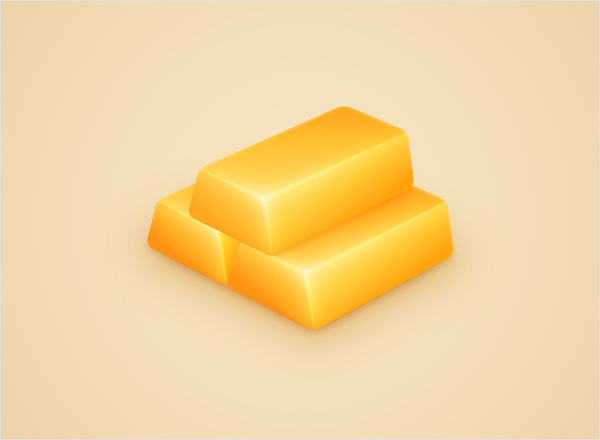
Step 1
Hit Control + N to create a new document. Select Pixels from the Units drop-down menu, enter 600 in the width and height box then click on theAdvanced button. Select RGB, Screen (72ppi) and make sure that the Align New Objects to Pixel Grid box is unchecked before you click OK. Enable the Grid (View > Show Grid) and the Snap to Grid (View > Snap to Grid). For starters you will need a grid every 5px, so simply go to Edit > Preferences > Guides > Grid, enter 5 in the Gridline every box and 1 in the Subdivisions box. Try not to get discouraged by all that grid, it will ease your work and keep in mind that you can easily enable or disable it using the Control + “ keyboard shortcut. You should also open the Info panel (Window > Info) for a live preview with the size and position of your shapes. Do not forget to set the unit of measurement to pixels from Edit > Preferences > Units > General. All these options will significantly increase your work speed while making this gold icon vector.
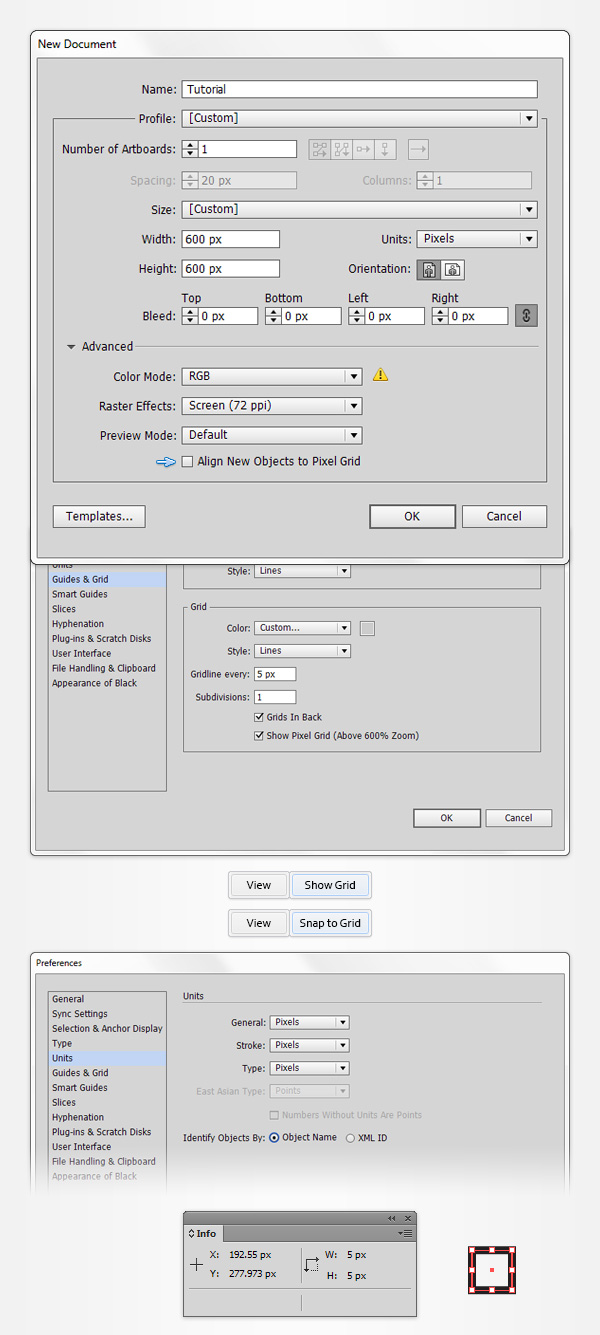
Step 2
Pick the Rectangle Tool (M) and focus on your Toolbar. Remove the color from the stroke then select the fill and set its color at R=209 G=211 B=212. Move to your Artboard and simply create an 80 x 40px rectangle, the Snap to Grid should ease your work. Focus on the top side of this rectangle and switch to the Direct Selection Tool (A). Select the left anchor point and drag it 10px to the right then select the right anchor point and drag it 10px to the left. In the end your rectangle should turn into a trapezoid as shown in the second image.
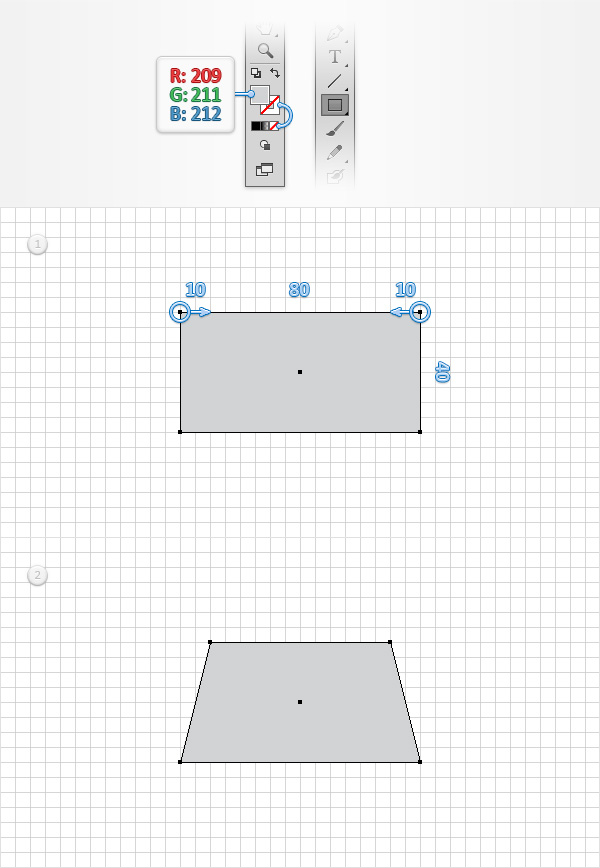
Step 3
Make sure that your trapezoid is still selected and make a copy in front (Control + C > Control + F). Select this copy and simply drag it 80px to the right as shown in the first image. Reselect one of your trapezoids and make a new copy in front (Control + C > Control + F). Select it and place it exactly as shown in the second image. Once again, the Snap to Grid will ease your work. Reselect all three shapes created so far and simply hitControl + G to Group them.
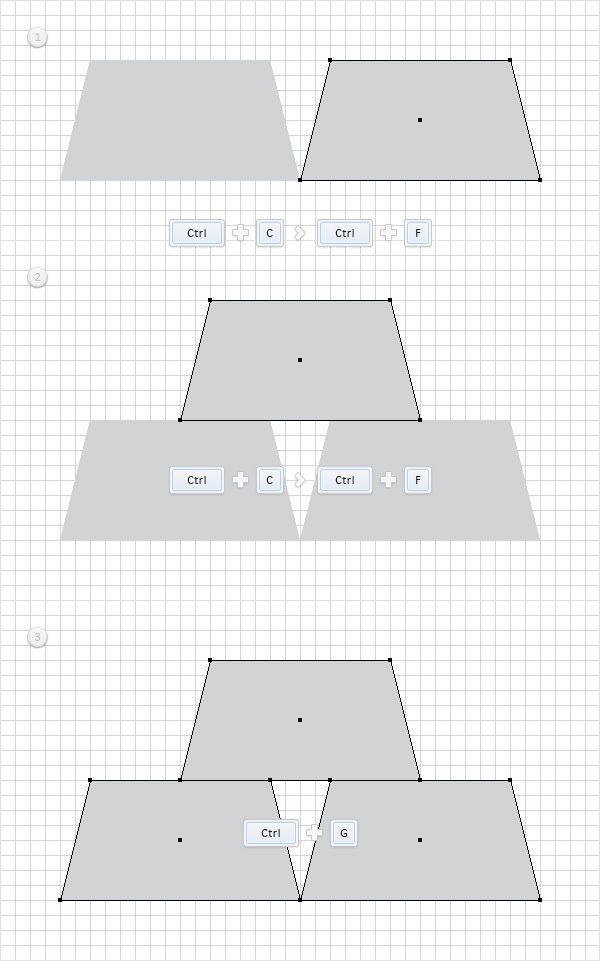
Step 4
Make sure that your group of shapes is still selected and go to Effect > 3D > Extrude& Bevel. Click the More Options button, enter all the properties shown in the following image then click OK.
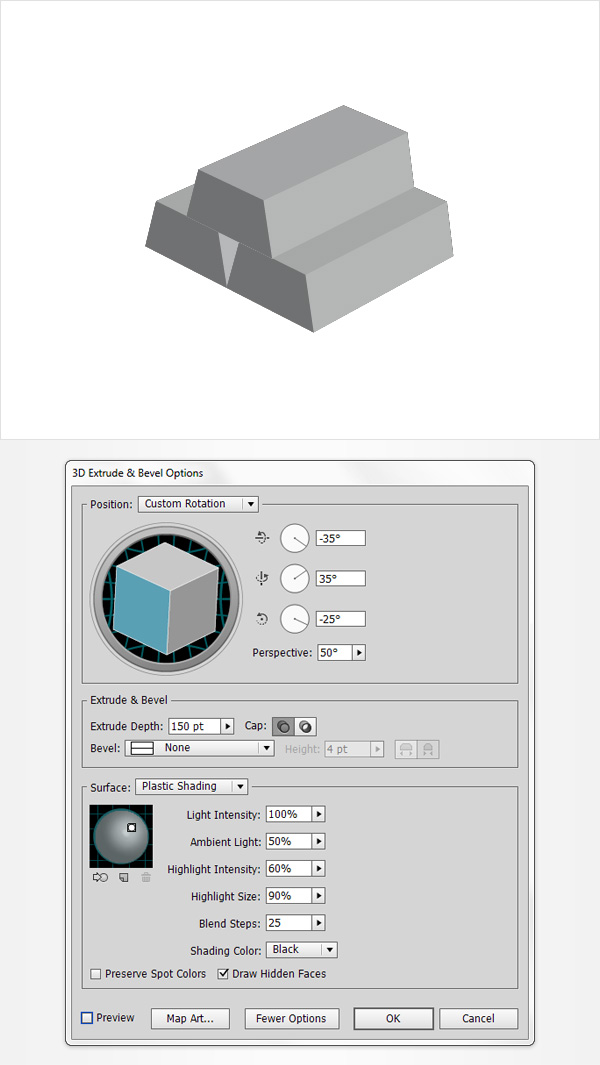
Step 5
Reselect your group of shapes and go to Object > Expand Appearance. Make sure that the resulting group of shapes is selected and simply hit Shift + Control + G three times.
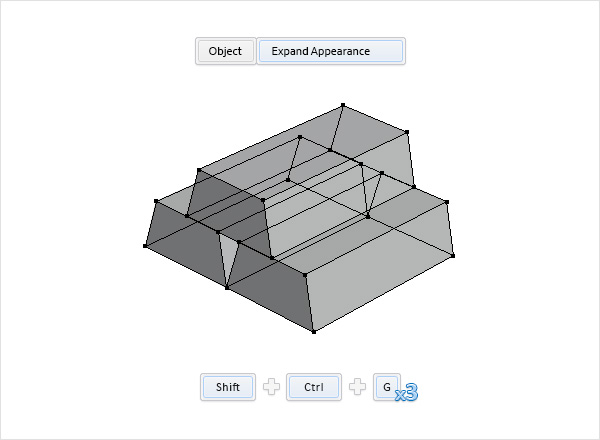
Step 6
Focus on the shapes that make up the top ingot of your gold icon vector. Select the shape that makes up the top side of the ingot gold icon vector and simply replace the existing fill color with R=39 G=170 B=225. Select the shape that makes up the right side of your ingot gold icon vector and replace the existing fill color with R=255 G=194 B=53. Select the shape that makes up the left side of your ingot and replace the existing fill color with R=0 G=148 B=68.
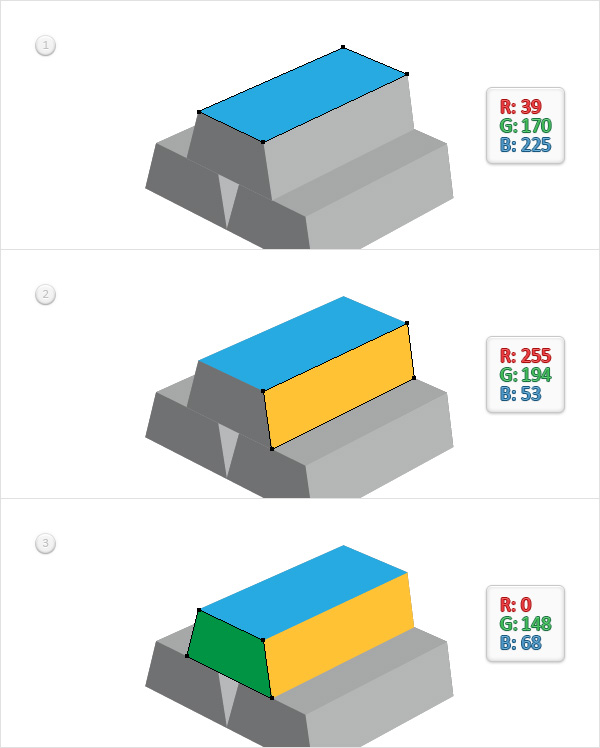
Step 7
Focus on the Layers panel (Window > Layers) and simply turn on the visibility for the three, colored shapes. Select the shape that makes up the bottom side of your top ingot gold icon vector, replace the existing fill color with black (R=0 G=0 B=0) then make it invisible. Select the remaining two shapes that are part of your top ingot and simply remove them using the Delete button from your keyboard.
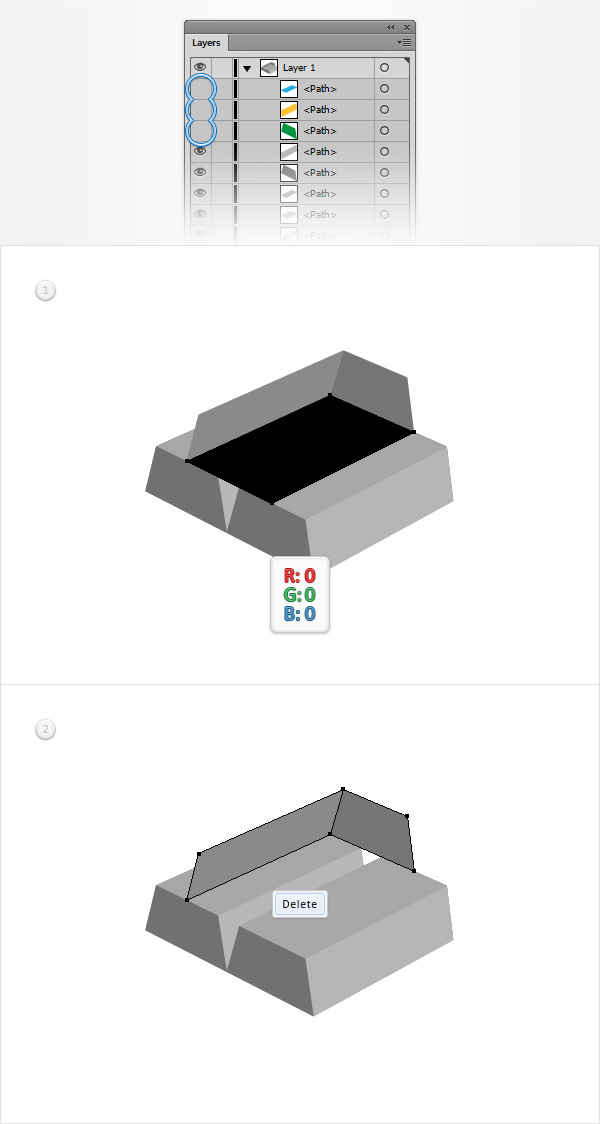
Step 8
Focus on the shapes that make up the other two ingot gold icon vectors and simply repeat the techniques mentioned in the last steps.
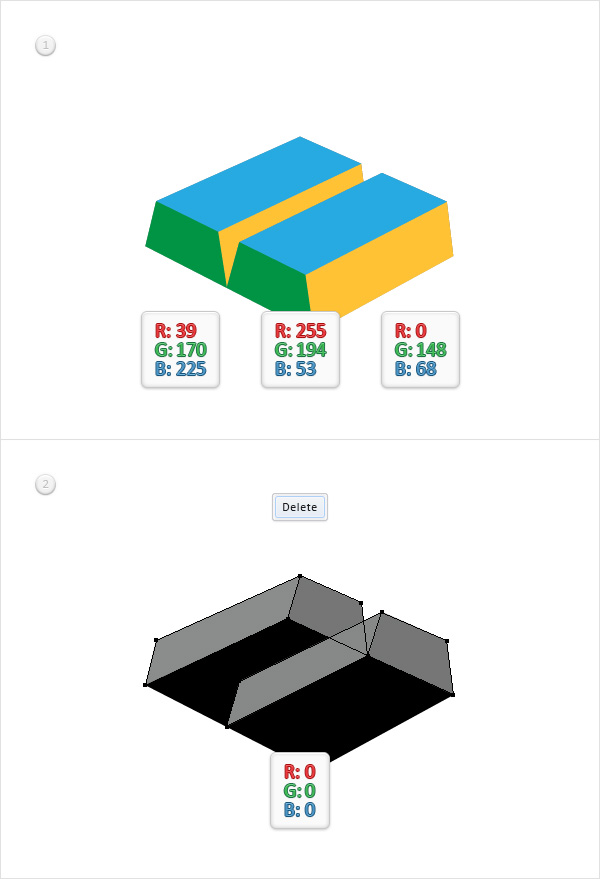
Step 9
Focus on the Layers panel and turn on the visibility for all your shapes. Select the blue, the yellow and the green shapes that make up your top ingot and Group them (Control + G). Move to the Layers panel, simply double click on this new group and rename it “top“. Return to your artboard, select the colored shapes that make up the bottom, right ingot and Group them (Control + G). Move to the Layers panel and rename this new group “right“. Select the three, colored shapes that make up the bottom, left ingot, Group them (Control + G) and name this new group “left“.
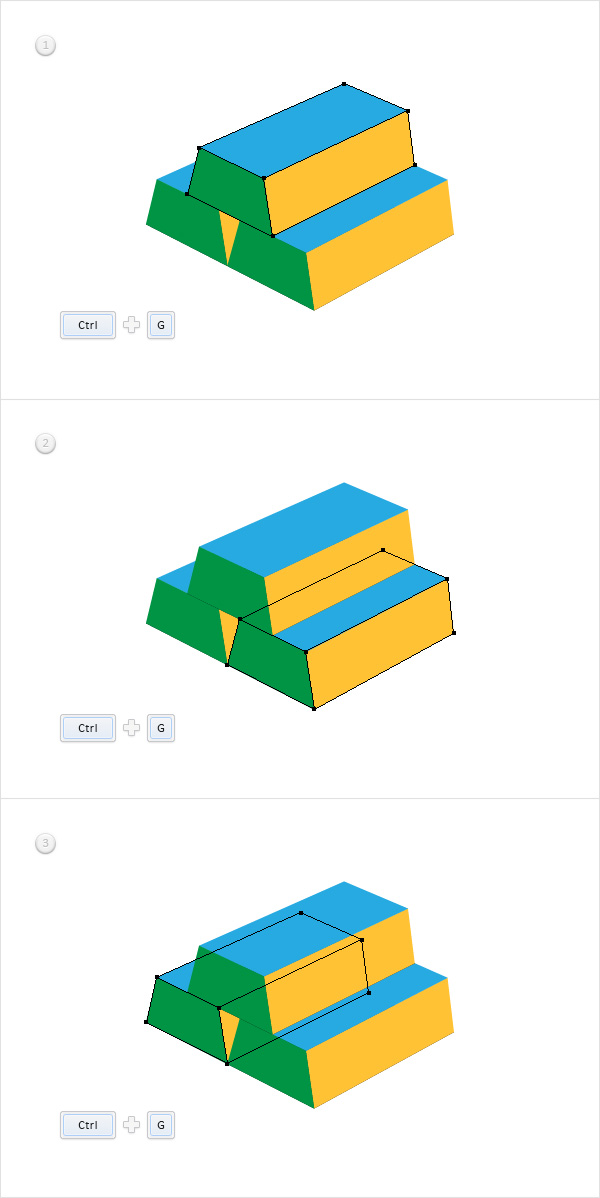
Step 10
Set the fill color at R=246 G=229 B=195, pick the Rectangle Tool (M) and simply click on your artboard to open the Rectangle window. Enter 610 in the Width and Height boxes then click the OK button. Next, you need to center this new shape, so open the Align panel (Window > Align). Set the aligning to Artboard (open the fly out menu and go to Show Options if you can’t see the Align To section as shown in the following image), make sure that your shape is selected then simply click the Horizontal Align Center and Vertical Align Center buttons. Also, hit Shift + Control + [ to send this shape to back. In the end your square should cover the entire artboard as shown in the following image.
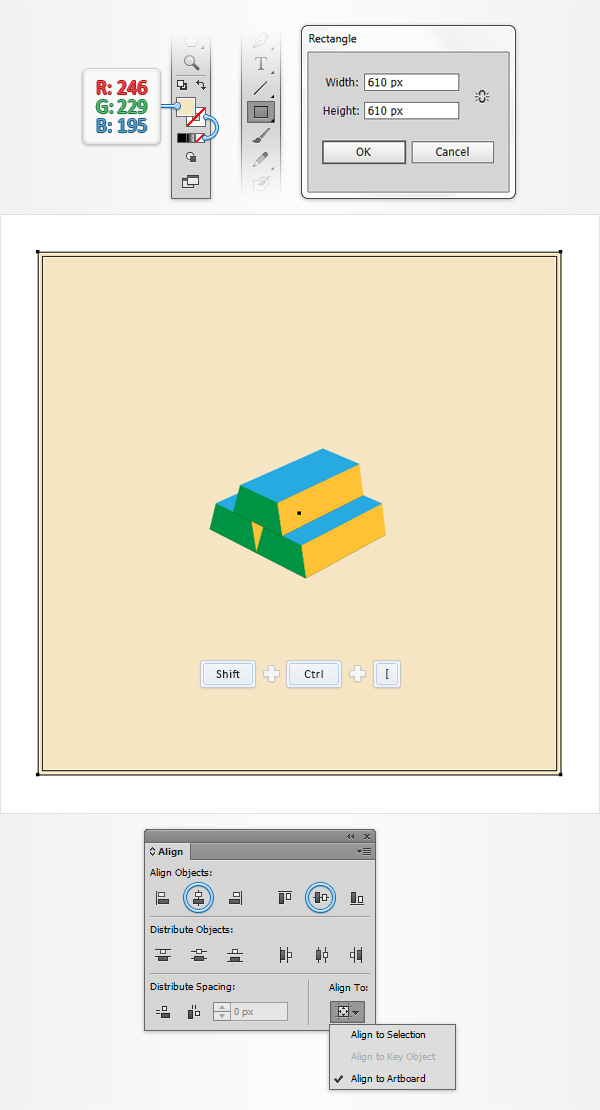
Step 11
Reselect the square made in the previous step, focus on the Appearance panel and add a second fill using the Add New Fill button (pointed by the blue circle in the following image). Make sure that this new fill stays selected, open the Gradient panel (Window > Gradient) and simply click on the gradient thumbnail to add the default black to white linear gradient. Keep focusing on your Gradient panel, select Radial from the Type drop-down menu then move to the gradient colors. Select the right slider and set the color at R=196 G=154 B=108 then select the left slider, set the color atR=246 G=229 B=195 and lower its Opacity to 0%. Grab the Gradient Tool (G), move to your Artboard and stretch that radial gradient as shown in the following image. Make sure that your square is still selected, focus on the Appearance panel and simply click on that “Opacity” piece of text that stands for your new fill. This should open the Transparency fly-out panel and you will need to lower the Opacity to 50% and change the Blending Mode to Multiply.
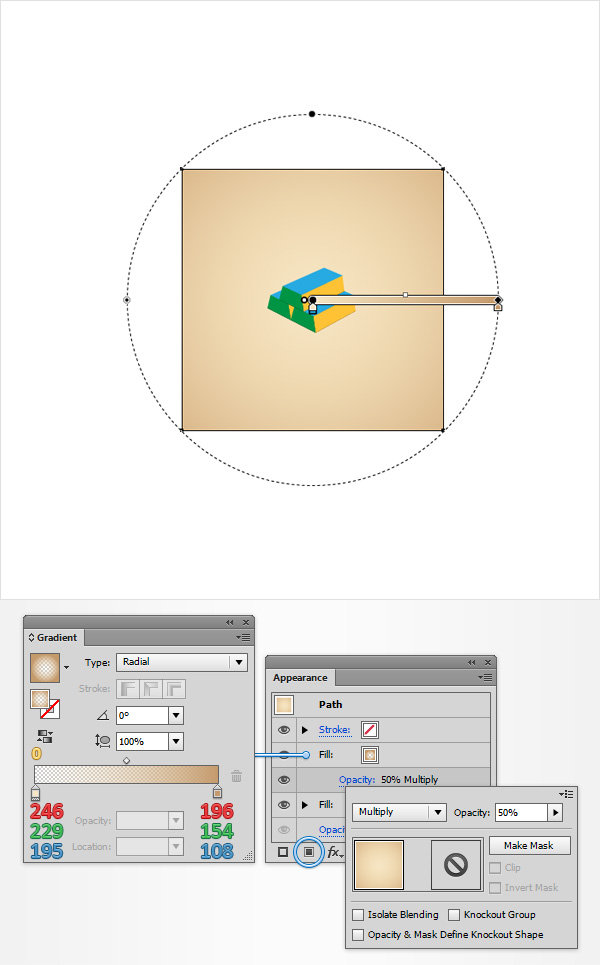
Step 12
Make sure that the black shape that makes up the bottom side of your top ingot gold icon vector stays selected and focus on the Appearance panel. First, select the existing fill, change its Blending Mode to Soft Light and go to Effect > Blur > Gaussian Blur. Enter a 10px Radius and click OK. Return to the Appearance panel and add a second fill for this shape using that same Add New Fill button. Select the newly added fill, lower itsOpacity to 10%, change the Blending Mode to Soft Light and go to Effect > Path > Offset Path. Enter a 1px Offset, click OK and return to theAppearance panel. Make sure that the top fill is still selected and simply duplicate it using the Duplicate Selected Item button (pointed by the blue circle in the following image). Focus on this new fill, open the existing Offset Path effect, increase the Offset to 3px and click OK. Get back to theAppearance panel, make sure that the entire path is selected (simply click on the “Path” piece of text from the top of the Appearance panel) and go to Effect > Stylize > Rounded Corners. Enter a 5px Radius and click OK.
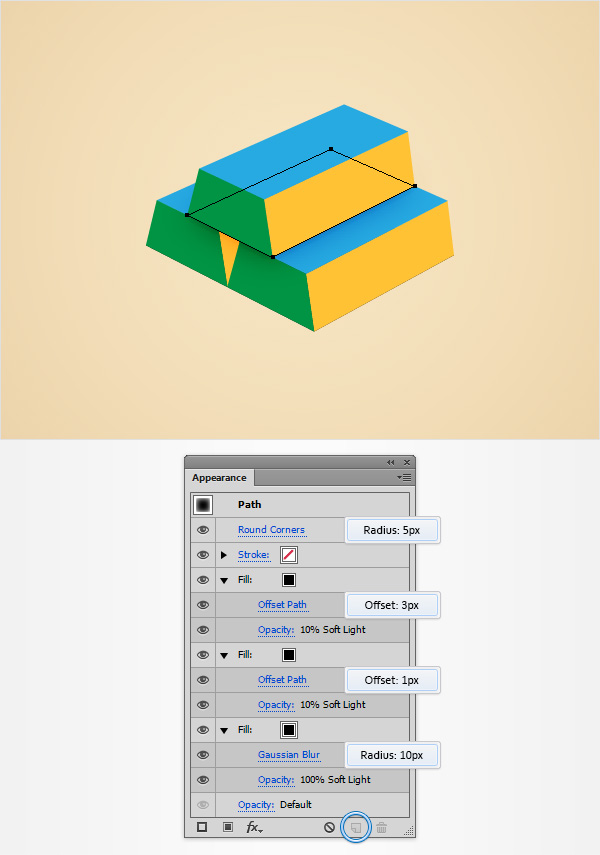
Step 13
Select the two blue shapes that make up the top side of the bottom ingots and duplicate them (Control + C > Control + F). Focus on the Layerspanel, select these fresh copies and simply drag them outside the groups, above your shape with multiple, black fills. Make sure that both copies made in this step are selected and simply hit Control + 8 to turn them into a simple compound path. Select it and replace the existing fill color with white (R=255 G=255 B=255).
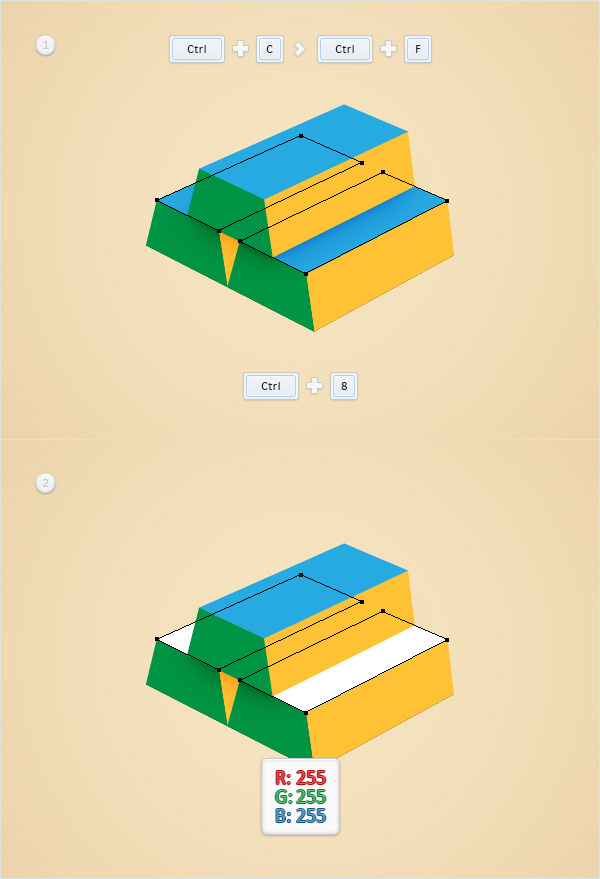
Step 14
Reselect your white compound path along with the black shape with multiple, black fills, open the Transparency panel (Window > Transparency) and simply click the Make Mask button. Focus on the Layers panel and make sure that this masked shape is placed immediately below your “top” group. In the end this should look like the second image.
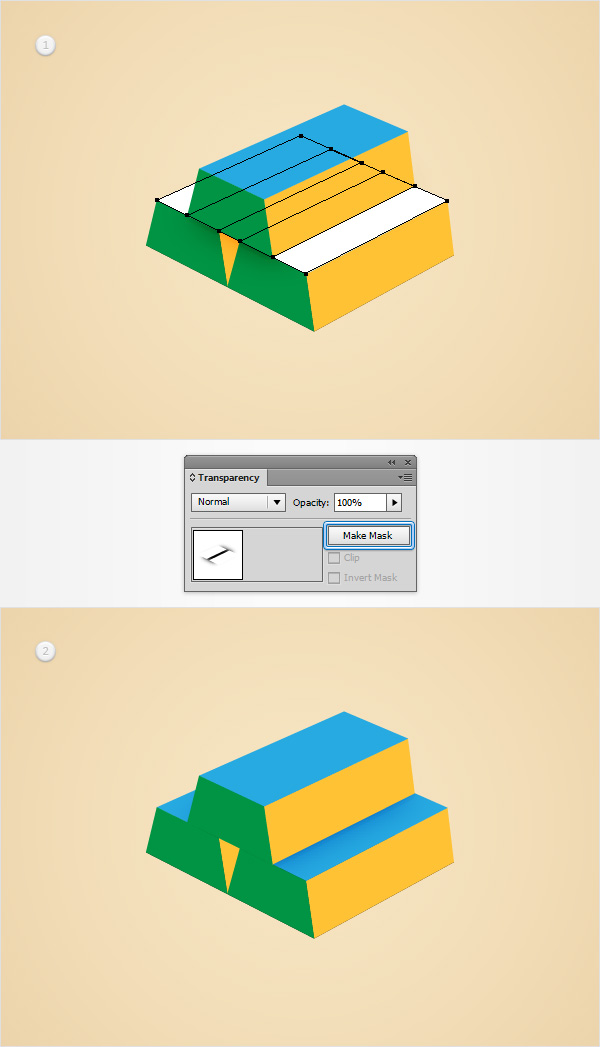
Step 15
Select the other two black shapes, open the Pathfinder panel (Window > Pathfinder) and simply click the Unite button.
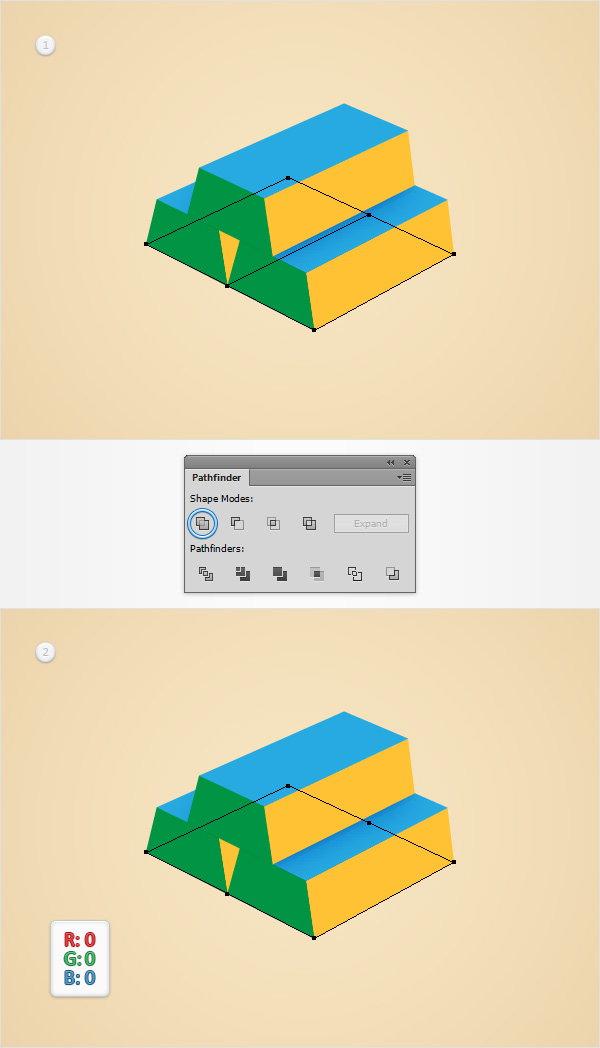
NHẤP VÀO ĐÂY ĐỂ XEM TIẾP....
